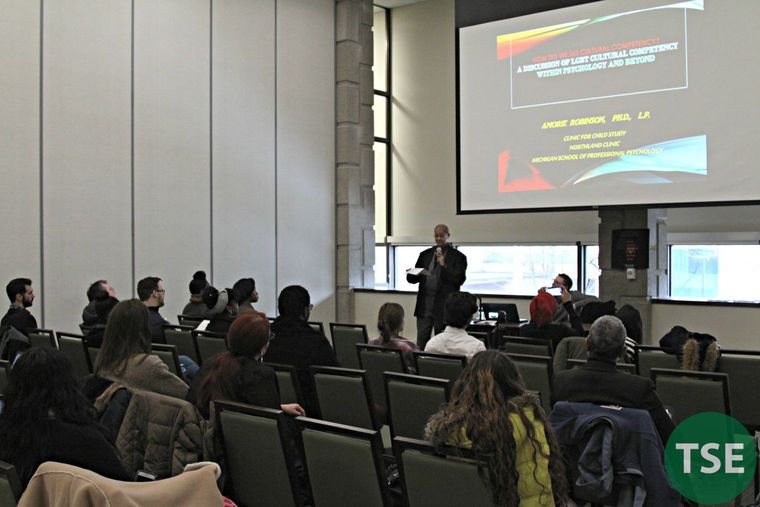AAPSO presents LGBTQA cultural competency discussion
- Aleanna Siacon
- Jan 24, 2016
- 3 min read
WSU’s African American Psychology Student Organization partnered with clinical psychologist Amorie Robinson to talk about cultural competency pertaining to LGBT issues.
Robinson, president of the Detroit Chapter of the Association of Black Psychologists and co-founder of the Ruth Ellis Center for at-risk homeless LGBT youth in Highland Park, currently works with the Clinic for Child Study and is presently based at the Northland Clinic in Farmington Hills.
In regards to why she delivers presentations regarding cultural competency, Robinson said, “I feel like I’m saving some lives.”
She expressed that this topic is relevant to everyone because all people know at least one LGBT person.
“The LGBT community is just as rich and complex as any other community, and yet people still hold rigid stereotypes about members of this community. Even those of other repressed communities, such as people of color,” said Robinson.
Robinson went over what each letter of LGBTQA represented: Lesbian, gay, biattractional, transgender, question and ally. The term GNG, gender nonconforming, was also introduced.
Topics such as the relation of minority stress to risks and health disparities, microaggressions, gender variance, gender expression, cisgender and heteroattractional privilege, pronoun preferences, gendered spaces and homophobia were touched on.
Robinson went on to define cultural competency as a set of clinical, academic and interpersonal skills, standards and ethical behaviors that allow individuals to increase their understanding, and recognition of the broad scope of dimensions that shape someone’s personal and group identities.
“The LGBT community can have racism and sexism,” said Robinson. “We get mad about a lot of this stuff, but the question is, how do we heal from a lot of these -isms in the community?”
Robinson uses the words attractional and attractionality to replace sexual and sexuality because she said everybody has an attractionality and attractional orientation that can exist on a spectrum or be fluid.
“I ask married couples, ‘Why did you marry that person? Did you marry that person because you wanted to go to bed with them and have sex with them?’ They say no, I’m attracted to them socially, emotionally, spiritually, physically and they go down the list.” said Robinson.
“Somehow our language is stuck on sexual. Homosexual, bisexual, heterosexual, but what about the rest of it? If we’re talking about sex, then we’ll go to sexual practice and behavior.”
Robinson prefers terms such as same-gender-attracted, homoattractional, heteroattractional, biattractional, heterosexism, heterocentric, homoprejudice and homonegativity.
The audience used Robinson’s terms during a Q&A session at the end of the presentation.
Senior psychology major Joe Lombardo said he was excited to be at a formal presentation about LGBTQA issues because the majority of his knowledge came from the Internet or through friends.
“One of the huge points of things like this is to get people who aren’t informed about these kinds of issues or don’t know a lot about this kind of content exposure to it,” said Lombardo.
Lombardo said that he always tries to be politically correct but he was surprised to hear some of the terms he assumed were appropriate-challenged.
“I think that it’s really important that people are exposed to this kind of information,” said Lombardo. “I see these issues as important for my lifetime and I want to be an informed, nice, good person for when I vote or for when I interact with anyone.”
Anthony Kostecki, junior psychology major and AAPSO treasurer, said the organization’s goal was to encourage enough interest and passion to start conversations that would help people educate themselves.
“We had a good turnout. We actually achieved our goal,” said Kostecki. “However, I think that these kinds of conversations and these types of events should be more widely spread on our campus.”
Kostecki said he can see why these discussions may raise some level of discomfort amongst people who do not identify with or are not aware or not accepting of this community, but talking to people may trigger a culture change.
“You kind of have to make it normal, like second nature. There shouldn’t be even any question about it,” said Kostecki. “Like the idea that it’s not necessarily gay marriage, it’s just marriage.”
Kostecki said these events are also important for psychologists and mental health professionals.
“A mental health professional should know how to specifically work with those people [LGBTQA],” said Kostecki. “Depression in a homoattractional male may look different from depression in a heteroattractional male because certain issues impact different groups in a specific way.”
The presentation was dedicated in memoriam of passed LGBT youth around the country and Metro Detroit.
Robinson can be reached at amorie.robinson@3rdcc.org.
For more information, contact reporter Aleanna Siacon: aleanna.siacon@wayne.edu. Follow her on Twitter: @AleannaSiacon










































Comments